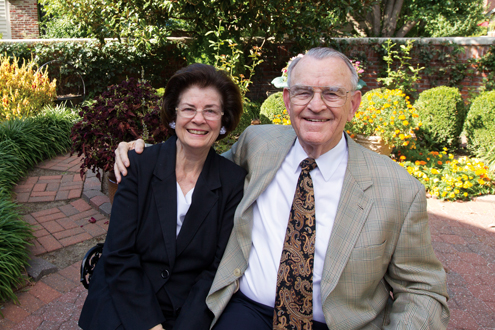
Hellen and Will Carpenter have enjoyed a long relationship with UMSL, which has included helping to start programs, chairing a leadership council, and creating scholarships and a successful lecture series. (Photo by August Jennewein)
If Will Carpenter was about 10 years younger and from St. Louis, there’s a good chance he would have attended the University of Missouri–St. Louis. Instead, he grew up during the Great Depression in Moorhead, Miss.
Will, who retired from Monsanto in 1992 as vice president and general manager of the company’s New Products Division, recalls his first job, working in the county health laboratory that tested people for venereal diseases. Then 12, he earned $1.25 per day to wash test tubes and slides, sans gloves.
“I am the only person who at 12 years of age had been exposed to every sexually transmitted disease known to God and man without any of the pleasure that goes with it,” Will says.
He studied a year at a community college, then transferred to Mississippi State University. A stint in the Naval Reserve, active duty in the Army in Korea and a PhD in plant physiology at Purdue University followed before he found himself in St. Louis.
Hellen Carpenter, meanwhile, was born in Dallas and first moved to St. Louis when her father, who worked as a civil engineer for the American Institute of Steel Construction, transferred north. After her father died when Hellen was 9, her mother returned to teaching and moved the family to the small Missouri towns of Thayer and later Fulton. She even briefly lived with her grandfather, Dr. James Naismith, who is famous for having invented basketball.
Hellen later worked at Monsanto where she met Will. That was at a time when many businesses, Monsanto included, didn’t approve of dating or marriage between co-workers. That didn’t stop them.
“I called him Charlie Brown so that no one would know who he was,” Hellen says. “And when we passed in the hall, we just passed. Nothing was said. If I wanted to talk to him, I called him on the phone.”
Will’s 34 years at Monsanto took him to 78 countries and 48 states, primarily agricultural areas. During his travels, he contended with submachine gun wielding Chinese Communist guerrillas, dodged rioters in Calcutta and crossed paths with a tiger in Jakarta.
“I may have had a trip I didn’t enjoy, but never one that was dull,” Will says, smiling.
Will has won numerous awards for his work, served on a number of prestigious science boards and committees and played a key role in the ratification of the worldwide chemical weapon treaty known as the Chemical Weapons Convention. He later served as the U.S. representative and co-chair of the Scientific Advisory Board of the Organization for Prohibition of Chemical Weapons, which won the Nobel Peace Prize in October.
The Carpenters’ affiliation with UMSL began in the mid-1980s when Will met Chuck Granger, Curators’ Teaching Professor of Biology and Education at UMSL, through their mutual connections to boards at the St. Louis Science Center and St. Louis Academy of Science. Will got involved with a few Granger-led science education projects, including the STARS program, Junior Science, Engineering and Humanities Symposium where he was a research paper judge for two decades and a keynote speaker. Will and Granger along with a mutual Monsanto friend, Monti Throdahl, started the Regional Institute for Science Education at UMSL, a program that led to the Des Lee Collaborative Vision of endowed professorships.
Over the years, scholarships have been established at UMSL in Will and Hellen’s name and Will spent “two tours of duty” as the chair of the College of Arts and Sciences Dean’s Leadership Council. The Carpenters also helped create at UMSL the Hellen & Will Carpenter Series on Contemporary Issues in American Society. Each semi-annual discussion features a different topic with a panel discussion moderated by a UMSL faculty member who is an expert on the subject matter. Past panels have focused on child abuse and health disparities in cognitive aging.
“The university is picking first-rate, important topics,” Hellen says. “And the subjects are such that it deserves a lot of public attention.”
Will says he identifies with several aspects of UMSL.
“They get a lot of bang for the bucks they spend,” Will says. “It fits in with my background, and I feel like I’m very comfortable at UMSL.”
This story was originally published in the fall 2013 issue of UMSL Magazine.














